|
|
|
I denne rapporten ser vi på hvordan det går med tidligere beboere i bo- og støttetilbudet for personer utsatt for tvangsekteskap, æresrelatert vold og negativ sosial kontroll. Vi ser på overgangen til en selvstendig tilværelse, og hva som fremmer og hemmer et gunstig utfall for den enkelte. Dette er en kvalitativ studie som bygger på intervjuer med tidligere beboere, ansatte i bo- og støttetilbudet, hjelpeapparatet og frivillige organisasjoner.
Rapporten viser hvordan mange av utfordringene fra tiden i bo- og støttetilbudet vedvarer. De som beskriver situasjonen som mest håpløs er de som har minst nettverk og størst psykisk helseutfordringer ved utflytting. Mange har sammensatte hjelpebehov i skjæringspunktet mellom familiearbeid, psykisk helsehjelp og sikkerhetsarbeid. I disse komplekse sakene er det stor risiko for å falle mellom stolene i et spesialisert hjelpeapparat. Materialet viser også hvordan forståelser av kjønn påvirker hvordan hjelpetilbud blir utformet, der menn ofte får et dårligere tilbud. Familiearbeid fremstår sentralt for muligheten til en trygg og avklart tilværelse. Det er et tydelig behov for mer koordinert innsats og omforent forståelse mellom ulike aktører om betydningen og innretning av dette. Muligheten til å leve et så normalt liv som mulig er prisgitt en kompleks prosess som avhenger av mange faktorer. Noen overordnede faktorer som fremmer en god reetablering er blant annet tilgang på trygge personer og nettverk, og en opplevelse av at man også har «vunnet» noe i denne prosessen.
0 Comments
Våre rådgivere Nertila Stringa og Marianne Gulli har turnert Finnmark med fagdager om vold i nære relasjoner. De har besøkt en rekke kommuner med gratistilbudet til kommunene. Alle kommunene tok imot tilbudet. Bortsett fra Karasjok, mens Kautokeino avlyste i siste liten.
Vi har allerede vært i Loppa, Nordkapp, Hammerfest og Tana. Karasjok kommune takket dessverre nei til tilbudet mens Kautokeino avlyste i siste liten. Det er jo et viktig tema, så jeg syns det er leit når vi allerede har reist så langt. Det er som er bra er at de andre kommunene har vært kjempefornøyde, så da er turen verdt det, sier Stringa til Sagat etter møte med Sametinget.
Hun har ikke fått noen begrunnelse for hvorfor disse kommunene ikke ville hente inn kompetanse på dette feltet.
Les mer om dette og om Nertilas ekspedisjon nordover på Sagat.
The project aims to create a safety net to address gender-based online violence and support girl victims of violence, through actions developing the capacity of school professionals to identify and manage incidents in the school environment, raising awareness of parents and families about the phenomenon and management of disclosure of violence.
The SAFENET project is implemented in the framework of the Active citizens Fund programme, with the Union of Women Associations of Heraklion and Heraklion Prefecture, and partners KUN - Centre for Equality and Diversity (Norway) and the Institute of Humanities and Social Sciences IAKE (Greece).
The €13.5 million Active Citizens Fund programme is funded by Iceland, Liechtenstein and Norway and is part of the European Economic Area (EEA) funding mechanism for the period 2014 - 2021, known as EEA Grants. The programme aims to strengthen and enhance the sustainability of civil society and to highlight its role in promoting democratic processes, enhancing citizens' participation in the public sphere and defending human rights. The Active citizens fund grant for Greece is managed jointly by the Bodossaki Foundation and SolidarityNow. Read more here: www.activecitizensfund.gr
Målet med prosjektet er:
SAFENET-prosjektet gjennomføres innenfor rammen av Active Citizens Fund-programmet, med Union of Women Associations of Heraklion and Heraklion Prefecture, og partnere Likestillingssenteret KUN og Institutt for humaniora og samfunnsvitenskap IAKE (Hellas) ).
Active Citizens Fund-programmet på €13,5 millioner er finansiert av Island, Liechtenstein og Norge og er en del av EØS-finansieringsmekanismen for perioden 2014 - 2021, kjent som EEA Grants. Programmet tar sikte på å styrke bærekraften til sivilsamfunnet og å fremheve dets rolle i demokratiske prosesser, styrke innbyggernes deltakelse i det offentlige rom og forsvare menneskerettigheter. Tilskuddet til Active citizens Fund for Hellas forvaltes i fellesskap av Bodossaki Foundation og SolidarityNow. Les mer her: www.activecitizensfund.gr
Om prosjektet
Dette prosjektet er et samarbeid mellom Likestillingssenteret KUN og Krisesentersekretariatet for å øke krisesentrenes kompetanse om digital vold. Vi startet arbeidet med en undersøkelse blant landets krisesentre for å kartlegge omfanget av denne formen for vold. Denne viste at bruk av teknologi ofte er en del av voldsbildet og at beboere og dagbrukere av krisesentrene opplever ulike former for digital vold:
Skeive er like voldsutsatt som andre, men oppsøker hjelpetjenesten i mindre grad. Av den grunn har likestillingssenteret KUN utviklet en veileder om vold i nære relasjoner og lhbti. Veilederen er nå tilgjen-elig på arabisk, engelsk, norsk, polsk, spansk, thai og urdu.
Veilederen er rettet mot voldsutsatte og hjelpeapparatet, og sier noe om hva vold i nære relasjoner er, ulike former for vold og minoritetsstress, og hvordan hjelpetjenesten kan skape trygge rom for alle voldsutsatte. I arbeidet med å utvikle veilederen har vi vært så heldige å ha med oss blant annet Oslo Krisesenter, Krisesenteret i Salten - Bodø kommune, Skeiv Ungdom - for mangfold og mot diskriminering, og Salam Norge. Kontakt Marte Taylor Bye for spørsmål. Den norske versjonen finnes også i trykt versjon, bestill denne her. Likestillingssenteret KUN har ferdigstilt en rapport om menneskehandel. På tross av at det er en av de groveste formene for utnyttelse som eksisterer, er det lite kunnskap om det i Norge generelt og i Nord-Norge spesifikt.
Med dette kunnskapsgrunnlaget ønsker vi å styrke forståelsen for fenomenet menneskehandel, herunder de juridiske og politiske rammene. Et annet mål med rapporten er å kartlegge den generelle situasjonen i Salten gjennom å peke på lokale utfordringer og behov, og å komme med anbefalinger for videre arbeid. Kort oppsummert kan vi si at menneskehandel er en form for utnyttelse av sårbare mennesker, som blir fanget i et avhengighetsforhold til den eller de som utnytter. Økonomisk sårbarhet, sosial ekskludering og avmakt gjør noen individer særlig utsatt for ulike former for menneskehandel. Generelt har vi også en mangel på sosiale tiltak for å redusere sårbarhet blant befolkningen. Økt bevissthet er et viktig verktøy for å bekjempe menneskehandel. En styrket forståelse og kompetanse om fenomenet hos de offentlige tjenestene og hjelpeapparatet er nødvendig for å kunne forebygge og effektivt sette inn tiltak for sårbare grupper i risiko. Rapporten er skrevet av Nezihat Bakar og Marianne Gulli. Den har blitt skrevet som en del av et prosjekt for å etablere et tverroperativt kompetanseteam (ToKt) i regionen. ToKt skal både drive kompetanseformidling og ha en operativ funksjon ved at ulike aktører kan drøfte saker på tvers av etater og sektorer. Prosjektet er finansiert av Justis- og beredskapsdepartementet. Les rapporten her. Har du bodd i bo- og støttetilbud for utsatte for æresrelatert vold? Da vil vi veldig gjerne snakke med deg.
Vi trenger mer kunnskap om hvordan det er å flytte ut av botilbudet og starte livet i samfunnet. Vi ønsker å finne ut hva som gjør at det blir en god overgang og hvilke utfordringer du møter når du skal flytte ut og i tiden etterpå. Hvis du har bodd i bo- og støttetilbudet vil vi veldig gjerne snakke med deg – enten ansikt-til-ansikt, per telefon eller digitalt. Vi er interessert i å høre om hvordan det var å bo i botilbudet, hvordan du opplevde det å flytte ut, og hvordan det har gått med deg i tiden etterpå. Ingen andre behøver å vite at du deltar i prosjektet. Vi jobber på Likestillingssenteret KUN og NOVA på OsloMet – storbyuniversitetet (oslomet.no) . Prosjektet finansieres av Barne-, ungdoms-, og familiedepartementet. Om dette er noe for deg, ta kontakt med en av oss så kan vi fortelle mer om prosjektet, Marte Taylor Bye, mobil: 91865154 eller Minela Košuta, mobil: 46957901 Les mer om prosjektet her. Ps. Vi blir glade for om dere deler informasjonen om prosjektet videre med andre. Ytring, holdning og handling- Forebygging av vold mot kvinner og vold i nære relasjoner er Justis- og beredskapsdepartementet sin årlige konferanse for å markere Norges ratifisering av Istanbulkonvensjonen – Europarådets konvensjon om forebygging og bekjempelse av vold mot kvinner og vold i nære relasjoner. Likestillingssenteret KUN organiserer konferansen på vegne av Justis- og beredskapsdepartementet.
Å bekjempe negative kjønnsstereotypier er å bekjempe vold mot kvinner. Denne konferansen ser nærmere på sammenhengene mellom ytringer, holdninger og voldelige handlinger. Til å gi oss nye innsikter kommer blant andre:
Deltakelse på konferansen er gratis. Vi feirer gjenåpningen av samfunnet med en helt fysisk konferanse i store lokaler, med nydelig lunsj og rikelig anledning til å snakke med de andre deltakerne. Vel møtt til en viktig samtale om voldsforebyggende arbeid på flere nivå! For eventuelle spørsmål, kontakt Mari Aarbakke, seniorrådgiver v/ likestillingssenteret KUN. |
Fagområder
All
Om oss
Ansatte English Last ned KUNs logo her Publikasjoner Kalender Dette tilbyr vi Prosjekter Likestilingspodden Nyhetsbrev Arkiv
June 2024
|

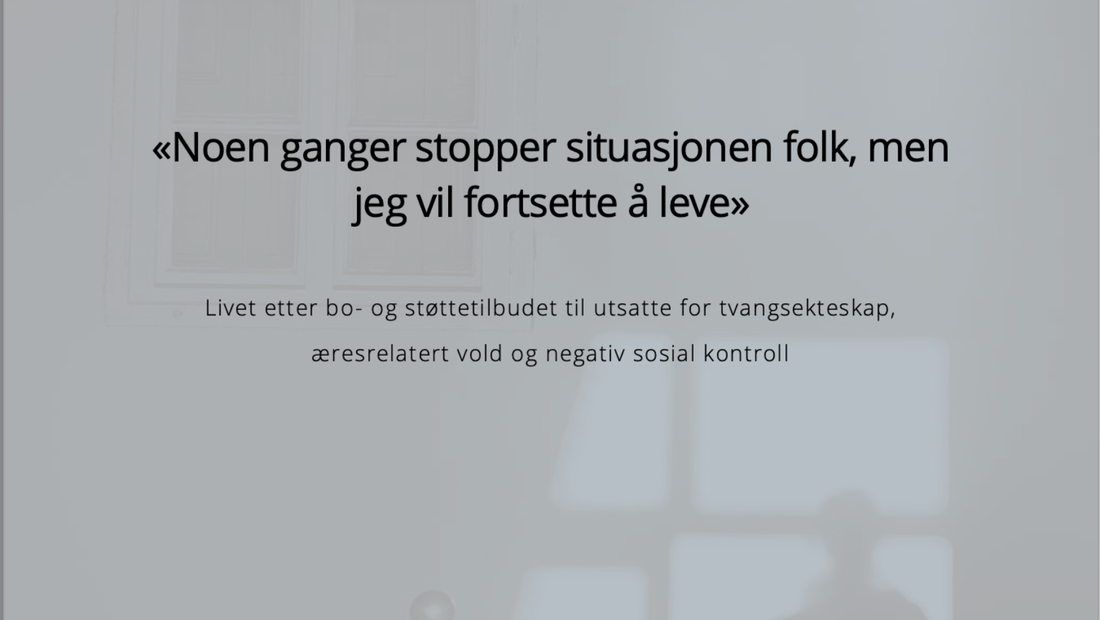


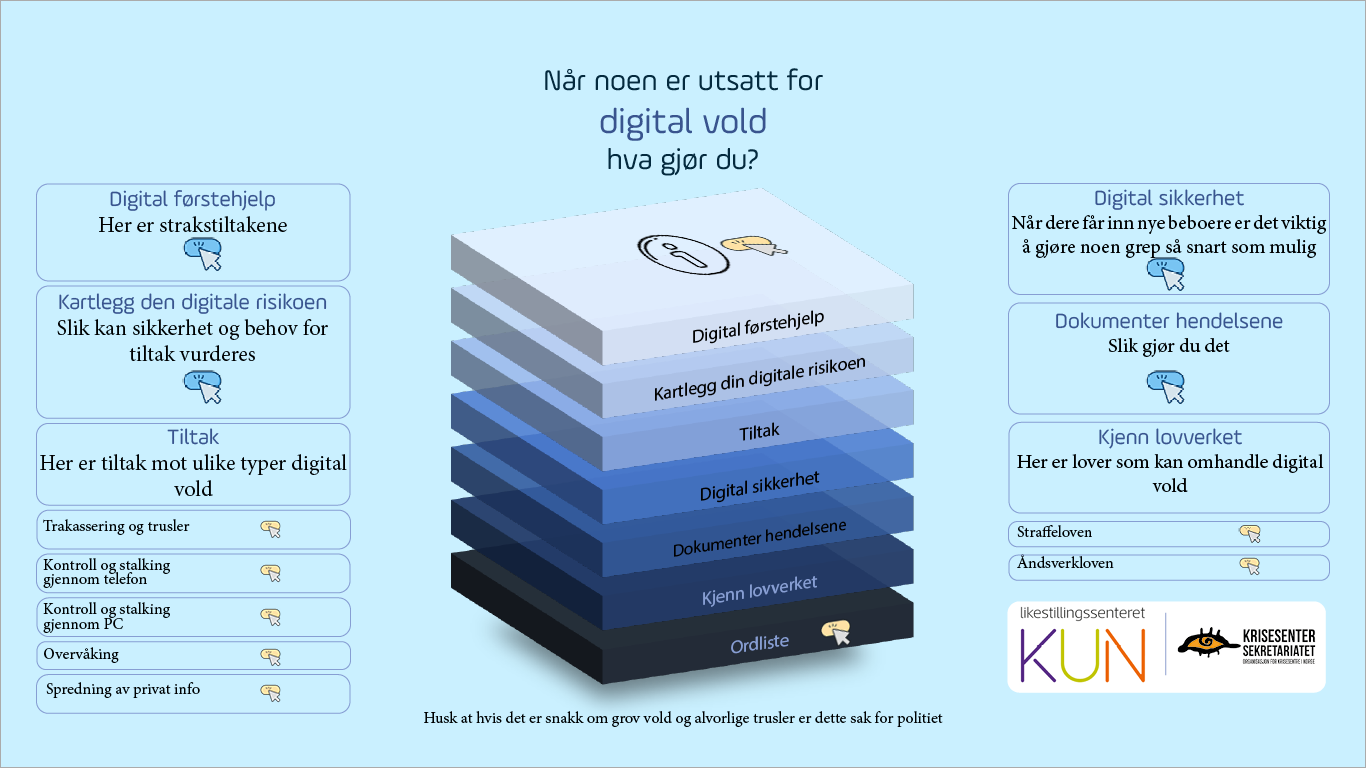
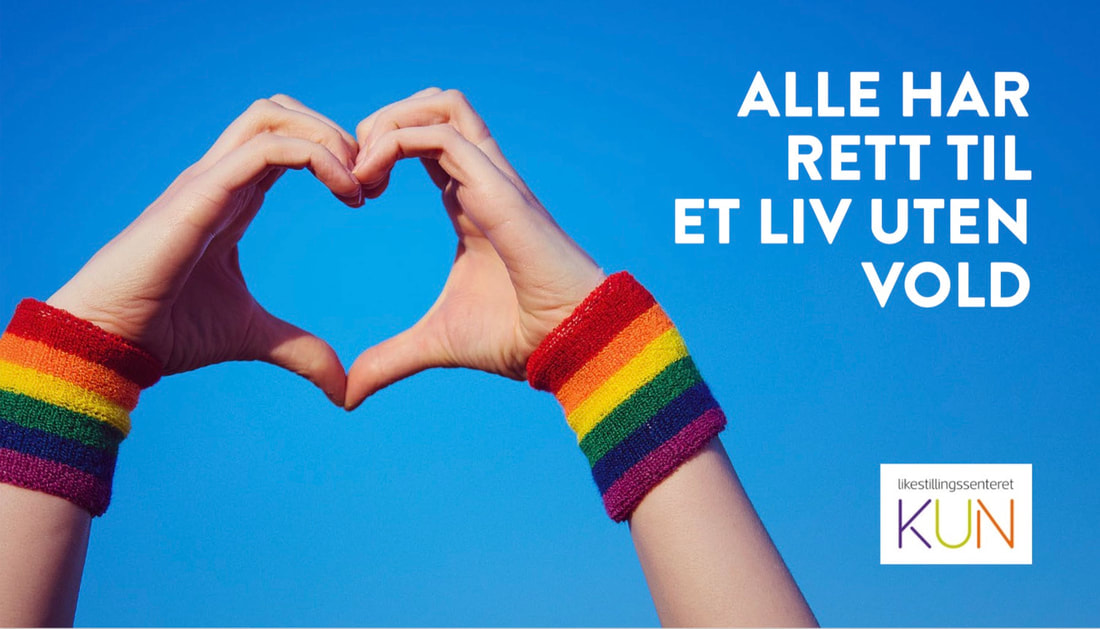
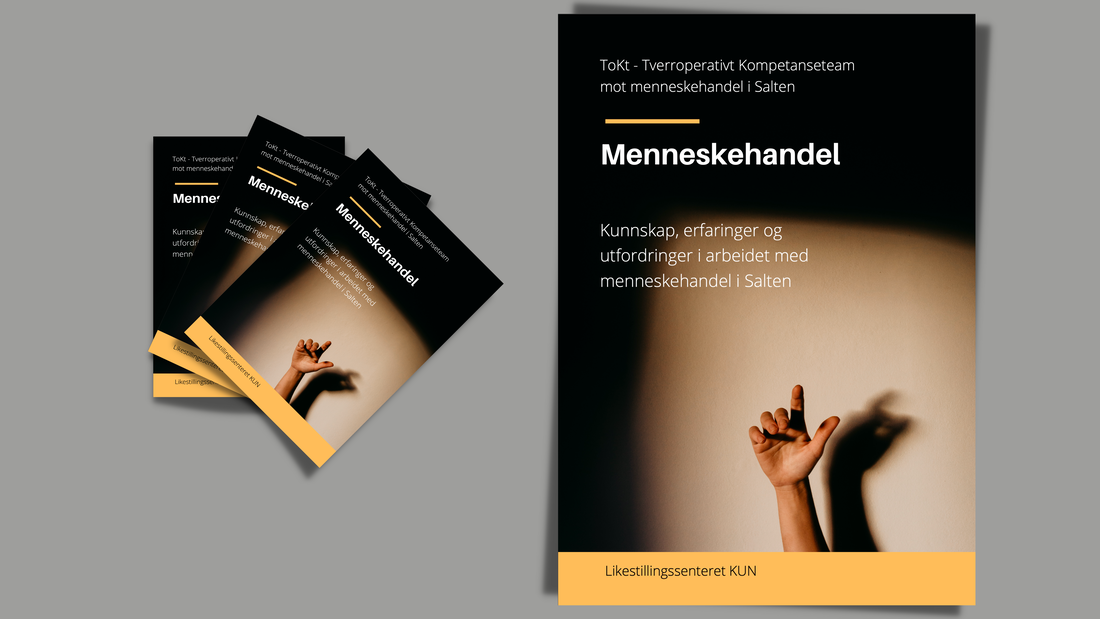

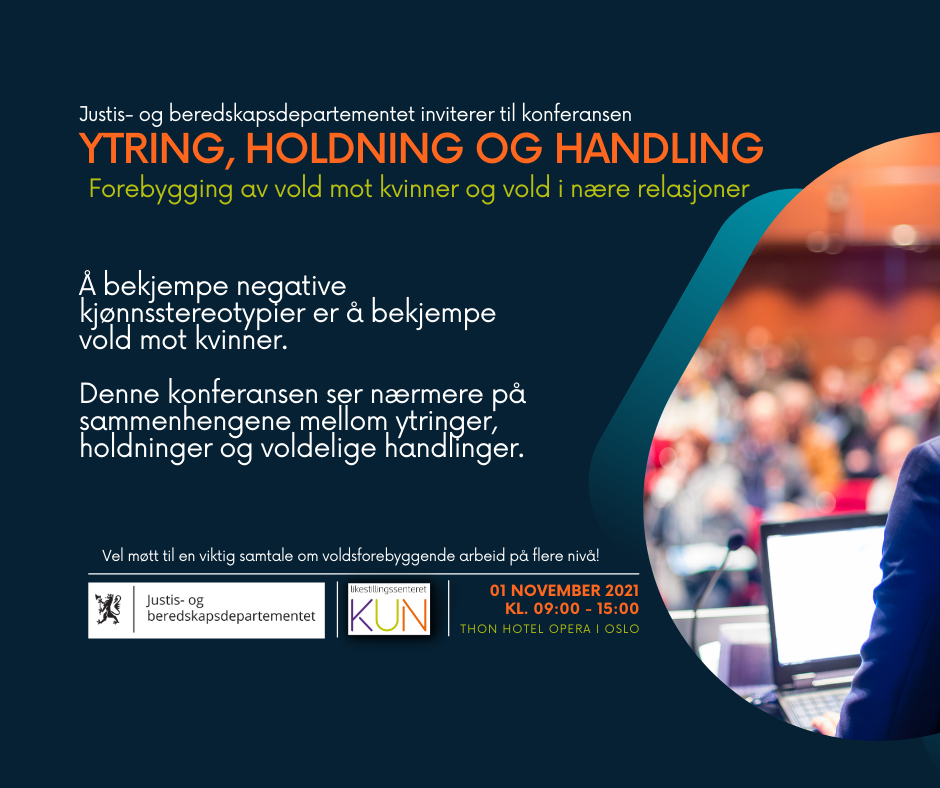
 RSS Feed
RSS Feed